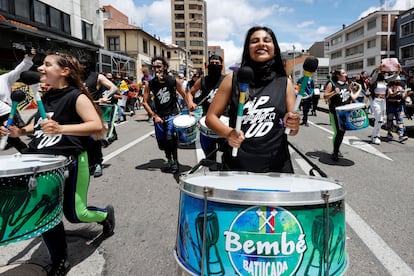The kids in Colombia
In the streets of Bogotá, Cali, Manizales and Medellín, young people are demanding the right not to be ignored by President Ivan Duque’s economic policies

Paro is Spanish for both strike and joblessness. The root of paro lies in the verb “to stop” – the body stops doing something. But in the streets of Bogotá, Cali, Manizales and Medellín, in Colombia, the bodies of young people are moving now, demanding the right not to be ignored by President Ivan Duque’s economic policies, in a country already marked by deep inequality. These young people are called pelados, a slang term for “kids” that literally means “bare-skinned” and allegorically means “without protection” – signaling the blatant fragility of bodies marked by class and racial inequality in times of pandemic, fragile bodies awaiting a protective State. The pelados are on the move.
They have been called the NEET generation, neither employed nor in education or training. And now some news reports questioning the sincerity of their rebelliousness often describe them as vandals. The pelados took to the streets to protest a fiscal reform plan that would hike taxes, and then they stayed in the streets in response to police violence. Duque’s proposed fiscal reform would boost tax collection in 2022 to the equivalent of 2% of the country’s GDP, a goal considered both daring and unprecedented in the recent economic history of Latin America’s third-largest economy. Duque’s reform package would put the greatest burden on the poorest working classes, even though it also impacts those with higher income. Despite a daily television program meant to fortify his waning charisma, Duque’s popularity index is pitifully low among youth: three out of four Colombians between the ages of 18 and 25 disapprove of the government, a paradox for the youngest president in the history of Colombia.
Two adolescents were killed on the first day of the protests: Marcelo Agredo and Jeirson García, aged 17 and 13
What do these pelados want? To feel that their future is protected by opportunities. Put very simply, they are calling for social justice so they can imagine a future free from inequalities – freedom from racism and poverty as well as the freedom to live in a country that does not return to the armed conflict that stained Colombia’s recent past. In philosophical terms, the pelados are demanding protection against regimes that manage life by reducing them to “bare life,” to borrow the words of Italian philosopher Giorgio Agamben. “Bare life” is the unprotected body, ravaged by sovereign power, a governmental regime of life typical of states of exception. At the intersection of philosophical abstraction with lived experience, these youth resist efforts to inflict a bare life on them. Wanting to do more than merely survive, they demand a future with possibilities.
“This is a demonstration for survival,” said Sandra Borda, professor at the University of the Andes. “These young people have been pushed well beyond their limits, and given the characteristics of the communities where they live, they have a terrible relationship with public forces.” In Cali, Colombia’s third-largest city, an estimated one in four people live in poverty. Two adolescents were killed on the first day of the protests: Marcelo Agredo and Jeirson García, aged 17 and 13. The poor community of Puerto Rellena is now known as Puerto Resistencia, or Port Resistance – the police do not set foot there. Francia Márquez, the Afro-Colombian activist whose life is at risk because she has confronted the country’s mining corporations, strolls the neighborhood’s streets without a care, a projection of the life the pelados dream of. In Port Resistance, Francia can do without her around-the-clock police escort. “Here, I would have to protect them,” she says. The pelados protect her.
Debora Diniz is a Brazilian anthropologist and researcher at Brown University.
Giselle Carino is an Argentinian political scientist and IPPF/WHR director.
Tu suscripción se está usando en otro dispositivo
¿Quieres añadir otro usuario a tu suscripción?
Si continúas leyendo en este dispositivo, no se podrá leer en el otro.
FlechaTu suscripción se está usando en otro dispositivo y solo puedes acceder a EL PAÍS desde un dispositivo a la vez.
Si quieres compartir tu cuenta, cambia tu suscripción a la modalidad Premium, así podrás añadir otro usuario. Cada uno accederá con su propia cuenta de email, lo que os permitirá personalizar vuestra experiencia en EL PAÍS.
¿Tienes una suscripción de empresa? Accede aquí para contratar más cuentas.
En el caso de no saber quién está usando tu cuenta, te recomendamos cambiar tu contraseña aquí.
Si decides continuar compartiendo tu cuenta, este mensaje se mostrará en tu dispositivo y en el de la otra persona que está usando tu cuenta de forma indefinida, afectando a tu experiencia de lectura. Puedes consultar aquí los términos y condiciones de la suscripción digital.








































